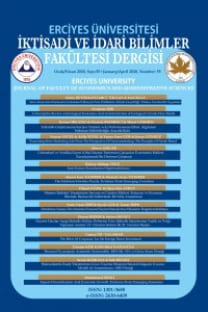KADIN İSTİHDAMININ REKABET GÜCÜ VE EKONOMİK BÜYÜME ÜZERİNE ETKİSİ: TÜRKİYE İLE REKABET GÜCÜ EN YÜKSEK ÜLKELERİN KARŞILAŞTIRILMASI
Son yıllarda kadın istihdamı ile ilgili çok sayıda çalışma yapılmıştır. Ancak kadın istihdamının ülkelerin rekabet gücü ve ekonomik büyümeleri üzerindeki etkisini inceleyen herhangi bir çalışmaya rastlanmamıştır. Bu çalışmada kadın istihdamının, Uluslararası Yönetim Geliştirme Derneği’nin (IMD) verilerine göre rekabet gücü en yüksek 10 ülke ve Türkiye’nin rekabet gücü ve ekonomik büyümesi üzerindeki etkileri karşılaştırılmaktadır. Çalışmanın temel hipotezi, “kadınların işgücüne katılımının ülkelerin hem rekabet gücü hem de ekonomik büyümeleri üzerinde olumlu etkiye sahip olduğudur.” Yapılan analizlerin sonuçlarına göre, rekabet gücü daha yüksek ülkelerde kadınların işgücüne katılımı rekabet gücünü olumlu yönde etkilerken, hem ülkelerin tamamı ele alındığında hem de rekabet gücü daha düşük ülkelerde kadınların işgücüne katılımının rekabet gücü üzerindeki etkisinin belirsiz olduğu tespit edilmiştir. Tüm ülke gruplarında kadınların işgücüne katılımının ekonomik büyüme üzerindeki etkisinin ise olumlu yönde olduğu kanaatine varılmıştır
Anahtar Kelimeler:
Kadın İstihdamı, Rekabetçilik, Ekonomik Büyüme
THE EFFECT OF WOMEN’S EMPLOYMENT ON COMPETITIVENESS AND ECONOMIC GROWTH: A COMPARISON OF TURKEY AND THE MOST COMPETITIVE COUNTRIES
In recent years, a large number of studies have been made about women’s employment but no study has been met about the effect of women’s employment on competitiveness and economic growth. In this study, the effect of women’s employment on competitiveness and economic growth has been compared between the most competitive countries according to the data of International Institute for Management Development (IMD) and Turkey. The main hypothesis of the study is that “women’s participation in employment would have positive effects on competitiveness and economic growth”. According to the results of the analyses made, while in more competitive countries female labor force participation affects competitiveness positively, in all of the countries discussed and in less competitive countries the effect of female labor force participation on competitiveness is concluded to be insignificant. Female labor force participation positively affects economic growth in all these groups.
Keywords:
Women’s Employment, Competitiveness, Economic Growth.,
___
- AKTAN, Coşkun C. and İstiklal Y. VURAL; (2004), Rekabet Dizisi: 3, Rekabet Gücü ve Türkiye, Ankara: TİSK Publications.
- Central Intelligence Agency (CIA); t.y., “CIA World Factbook”, Internet Address: https://www.cia.gov/library/publications/the-world-factbook/, Date of Access: 03.02.2010.
- DOLLAR, David and Roberta GATTI; (1999), “Gender Inequality, Income and Growth: Are Good Times Good for Women”, Policy Research Report on Gender and Development Working Paper Series, 1, pp. 1-40.
- International Labor Organization (ILO); t.y., “Key Indicators of Labor Market (KILM)”, Internet Address: www.ilo.org/kilm, Date of Access: 08.05.2010.
- KLASEN, Stephan and Francesca LAMANNA; (2009), “The Impact of Gender Inequality in Education and Employment on Economic Growth: New Evidence for A Panel of Countries”, Feminist Economics, 15(3), pp. 91-132.
- KOCACIK, Faruk and Veda B. GÖKKAYA; (2005), “Türkiye’de Çalışan Kadınlar ve Sorunları”, Cumhuriyet University Journal of Economics and Administrative Sciences, 6(1), pp. 195-219.
- ÖZER, Mustafa and Kemal BİÇERLİ; (2003/2004), “Türkiye’de Kadın İşgücünün Panel Veri Analizi”, Anadolu University Journal of Social Sciences, 3(1), pp. 55-86.
- Stata Corporation; (2009), Stata: Release 11. Statistical Software, College Station.
- TANSEL, Aysıt; (2002), “İktisadi Kalkınma ve Kadınların İşgücüne Katılımı: Türkiye’den Zaman-Serisi Kanıtları ve İllere Göre Yatay Kesit Kestirimleri”, ERC Working Papers in Economics 01/05T, pp. 1-31.
- TZANNATOS, Zachariadis; (1999), “Women and Labor Market Changes in the Global Economy: Growth Helps, Inequalities Hurt and Public Policy Matters”, World Development, 27(3), pp. 551-569.
- United Nations University (UNU-Wider); t.y., “World Income Inequality Database”, Internet Address: www.wider.unu.edu, Date of Access: 25.08.2010.
- Worldbank; t.y., “World Development Indicators (WDI)”, Internet Address: http://data.worldbank.org/data-catalog/world-development-indicators, Date of Access: 12.02.2010.
- ISSN: 1301-3688
- Yayın Aralığı: Yılda 3 Sayı
- Başlangıç: 1981
- Yayıncı: -
Sayıdaki Diğer Makaleler
KATILIM BANKALARINDA ELEKTRONİK PAZARLAMA UYGULAMALARI: ELAZIĞ İLİ ÖRNEĞİ
KAYSERİ İLİNİN MOBİLYA SEKTÖRÜ REKABET GÜCÜ: AÇIKLANMIŞ KARŞILAŞTIRMALI ÜSTÜNLÜK ENDEKSİ
Hatice ERKEKOĞLU, Zerrin KILIÇARSLAN, Hülya GÖKNAR
KÜRESELLEŞME SÜRECİNDE İNSAN KAYNAKLARI UYGULAMALARINDAKİ DÖNÜŞÜM: KAYSERİ ÖRNEĞİ
Cüneyt KILIÇ, Yılmaz BAYAR, Halil ÖZEKİCİOĞLU
TÜKETİCİ YENİLİKÇİLİĞİ VE ALGILANAN RİSKİN SATIN ALMA DAVRANIŞINA ETKİSİ
